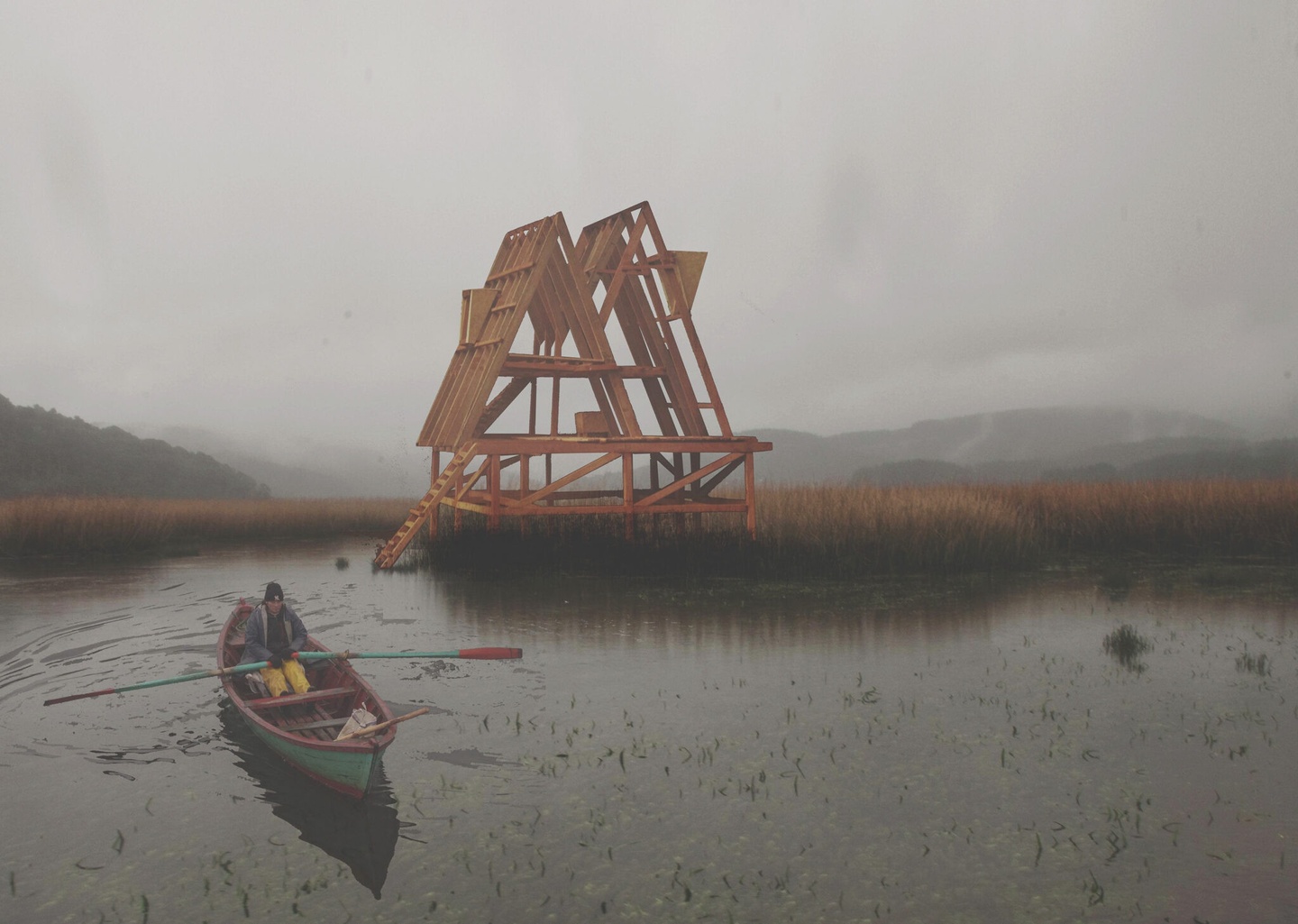2021-22 Steedman Fellowship Awarded
2022-05-13 • Liam Otten

A rendering for the Villanueva Boat Builder’s Refuge and Boatshed (2014-15) in Patagonia, Chile, by Arijit Chatterjee, winner of the 2021 Steedman Fellowship. (Image courtesy of Arijit Chatterjee)
Arijit Chatterjee wins 2021-22 Steedman Fellowship
Arijit Chatterjee, an architect based in Ahmedabad, India, has been selected as winner of the 2021-22 James Harrison Steedman Memorial Fellowship in Architecture.
Established in 1926, the biannual Steedman Fellowship is organized by the College of Architecture and Graduate School of Architecture & Urban Design at the Sam Fox School of Design & Visual Arts at Washington University in St. Louis along with the American Institute of Architects (AIA) St. Louis. The $75,000 prize, which supports research through international travel, is awarded on the basis of applicant proposals. It is among the largest such fellowships in the United States.
With the theme of “Disruption,” participants were challenged to explore how architecture, in light of the ongoing climate crisis, can help to chart new paths and implement far-reaching solutions. Mary Ann Lazarus, an internationally recognized leader in sustainable design, chaired a jury comprised of both professional architects and academic scholars.
Chatterjee’s proposal, “Mapping the mind of the river: Architecture as a loss of control,” was chosen from a field of nearly 50 applicants from a dozen nations around the world. The project explores how engineered environmental systems strategically shape the distributions of natural resources — thus “weaponizing food and water as instruments of control” — as well as the reparative potential of both human and non-human adaptations.

A rendering from Chatterjee’s ongoing “Living with the Ganges Delta” project. (Image courtesy of Arijit Chatterjee)
“Floods, droughts, famines and the meandering river problematize the role of the architect,” Chatterjee explained, “highlighting the need to consider the fundamental interconnectedness of nature and culture.” As Steedman Fellow, Chatterjee will investigate river systems across Bangladesh, Burma, China, Uzbekistan and Kazakhstan — a journey of more than 16,000 kilometers — and develop a “Handbook of Repair,” which will document conditions, explore Indigenous practices and propose a range of interventions.
In selecting Chatterjee, the jury was impressed by his examination of “how political power overlaps with landscapes” and to the attention paid to “the material and spatial consequences of these power struggles over water and industry.”
Currently a visiting faculty member in the Faculty of Architecture at CEPT University in Ahmedabad, Chatterjee earned his bachelor’s in architecture from CEPT in 2008 and studied at the École Nationale Supérieure d’Architecture de Paris-Belleville before earning his master’s in architecture from Pontificia Universidad Católica de Valparaíso in 2015. He is also a visiting faculty member at the Bengal Institute for Architecture, Landscapes and Settlements in Dhaka, Bangladesh, and maintains an independent practice that includes projects in Bangladesh, Chile and India.

A model for a floating workshop in Western Patagonia (2015).(Image courtesy of Arijit Chatterjee)
Alternate and special mentions
Jack Rusk, a 2022 master’s candidate at the Yale School of Architecture and the Yale School of Environmental Management, was selected as alternate. His proposal, “A Necessary Reckoning: Architectures of Reciprocity and Reparation,” seeks to address the limitations of quantitative accounting of future impacts by connecting abstract accounting for future harm to immediate acts of reparation. Rusk earned his bachelor’s degree in plant sciences from the University of California, Santa Cruz.
Four submissions received honorable mentions:
Laura Pappalardo was recognized for “Indigenous Technologies of Ground Repair.” Pappalardo earned a bachelor’s in architecture and urbanism from the Escola da Cidade, Brazil, in 2017 and a master’s in environmental design from the Yale School of Architecture in 2021.
Audrey Fischer was recognized for “Stewarding Chinampas: Co-speculating Our Many Worlds.” A 2022 master’s candidate at the Yale School of Architecture, Fischer earned a bachelor’s in architectural studies from the University of Waterloo in 2018.
Daniel Jacobs was recognized for “Water, Land, and Oil: Liquid Ecologies in the Dutch Delta, Indonesian Archipelago and Texas Gulf Coast.” A co-founder of the Houston-based firm HOME-OFFICE, Jacobs earned a bachelor’s in architecture from the Sam Fox School in 2010 and a master’s in architecture from Yale School of Architecture in 2014.
Pilar Zuluaga was recognized for “Undocumented Landscapes and the Architecture of Migration.” Currently a landscape designer at Spackman Mossop Michaels in New Orleans, Zuluaga earned a bachelor’s in architecture from the Universidad de Los Andes in 2019 and a master’s in landscape architecture from Auburn University in 2021.

As Steedman Fellow, Chatterjee will travel more than 16,000 kilometers along river systems across Bangladesh, Burma, China, Uzbekistan and Kazakhstan. (Image courtesy of Arijit Chatterjee)
Jury and organizers
In addition to Lazarus, the jury included: Shantel Blakely, assistant professor of architecture in the Sam Fox School; Billy Fleming, the founding Wilks Family Director of the Ian L. McHarg Center in the Weitzman School of Design at the University of Pennsylvania; Janette Kim, founding principal of All of the Above and assistant professor and director of Urban Works Agency at the California College of the Arts; and Marsha Maytum, founding principal at Leddy Maytum Stacy Architects in San Francisco.
The 2021 fellowship was organized by the Steedman Governing Committee: Patty Heyda and Chandler Ahrens, both associate professors at the Sam Fox School, and architect William Wischmeyer, the 1973 Steedman Fellow.
About the Steedman Fellowship
The Steedman Fellowship is supported by an endowment given to the Sam Fox School’s College of Architecture in honor of James Harrison Steedman, who earned a degree in mechanical engineering from Washington University in 1889. A decorated veteran, he served as a lieutenant commander in the U.S. Navy during World War I and died in 1921. The memorial was established by Steedman’s widow, Virginia Clark Weddell, and his brother, George Fox Steedman.
Learn more about the Steedman Fellowship.
